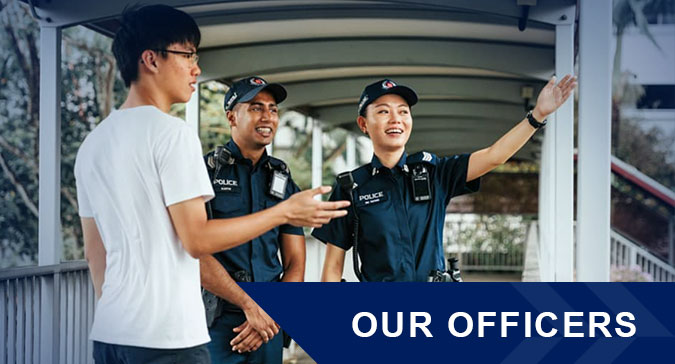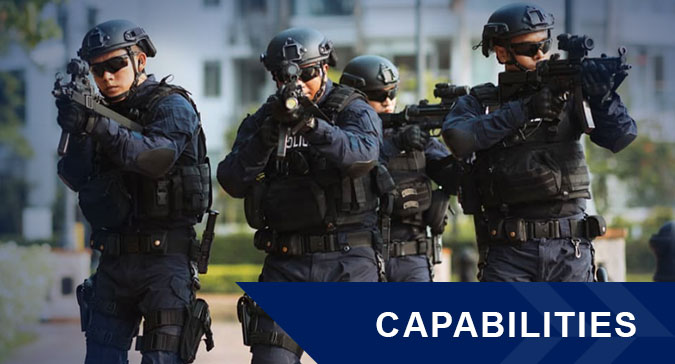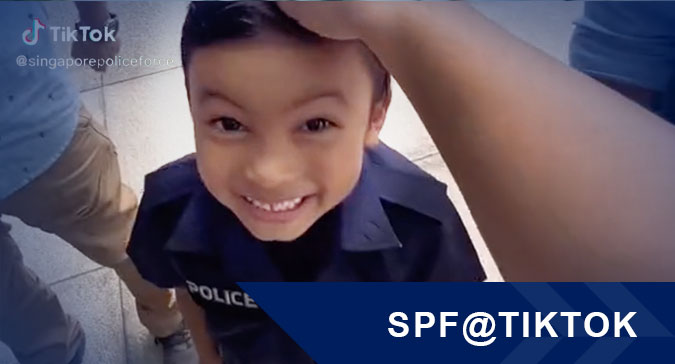Applying empathy and professionalism to better support officers and victims of crime.
By: Domnic Dass

We speak with Ms Tiffany Nicole Danker from the Police Psychological Services Department (PPSD) to learn more about her role as a Police Psychologist and how she manages community volunteers known as Victim Care Officers (VCOs). Read on to also find out more about how Police Psychologists support both officers and victims of crime!
Tell us about your job as a Police Psychologist.
I’m currently managing the Victim Psychology portfolio, which involves managing a pool of community volunteers known as VCOs, within the Victim Care Cadre (VCC) programme.
I assist in conducting training for them and conduct research on victim management to better support our VCOs and victims of crime. This helps ensure that the VCOs are continually updating their skills and knowledge related to victim care.
What motivated you to join the Singapore Police Force (SPF) and become a Police Psychologist?
I’ve always been interested in psychology and, in particular, how the human mind works. I was drawn to the SPF as it offered me opportunities to help others by applying my knowledge and skills to provide support to those who play an active role in safeguarding Singapore. This role also gives me the opportunity to help victims of crime.
Tell us more about the Victim Care Cadre programme and what are the essential qualities required to qualify as a VCO.
The Victim Care Cadre programme aims to ensure that victims of crime are supported throughout the investigation and criminal justice process. To qualify as a VCO, volunteers must go through a stringent selection and training process. Volunteers must also meet strict criteria and possess relevant qualifications, such as a Bachelor’s degree in Counselling, Psychology or Social Work, which are essential in equipping them with the necessary theoretical knowledge for their work.
Given the nature of the work and the diverse personalities that they have to support, a VCO needs to possess an intrinsic motivation and altruism to help people.
Empathy is another crucial soft skill when it comes to interacting and connecting with victims. Most importantly, to be a VCO, you need to be mentally resilient. In the course of their work, VCOs may encounter potentially traumatising cases, and having the resilience to help them cope and not be weighed down emotionally or mentally would enable them to provide effective care and support to the victims.
Do Police officers also undergo training on handling victims of trauma?
As part of their respective basic training, regular officers in the SPF will have to undergo a module on sensitivity training that is provided by the PPSD. Some of the topics covered are soft skills on victim management and theoretical knowledge of victims and trauma. They also learn to develop active listening skills as well as a safety-emotion-information model to organise victims’ needs.
Within the SPF, a group of officers known as Sexual Crime Duty Officers are specially trained to handle sexual crimes. These officers must also undergo assessment and training by the PPSD to ensure that they are aware of the considerations when interacting with victims, and effectively apply empathy and soft skills for victim management.
What changes in victim care have you observed over the years in your role?
As Police Psychologists managing VCOs, we’re constantly reviewing and improving how we support victims. One of the initiatives that we found to be effective is to increase the diversity of our community volunteers. In 2014, the pool of volunteers was mainly undergraduates. But in recent times, we’ve expanded to include more professionals.
In the past few years, we’ve also seen an increasing number of people requesting for victim care services in this programme, reinforcing our belief that our efforts have had a positive effect.
Which part of your job brings you the most satisfaction?
Being able to make a direct, positive impact in people’s lives gives me immense satisfaction.
What are some of the challenges you face in your line of work?
I’m always reflecting on what more can I do to help victims. However, after going through the feedback and sharing sessions by victims, we learnt that our efforts were valuable and needed.
Given that we’re dealing with human beings and there are varying degrees of sensitivities for each case, it’s imperative that we remain highly vigilant and professional when helping officers and victims.
How can one join as a VCO?
Applicants can indicate their interest to join the programme through Volunteer.sg. We also send recruitment email to universities and professional organisations annually to recruit potential volunteers.
We can all play a part to keep Singapore safe and secure! Learn more about the Singapore Police Force’s volunteer schemes.










